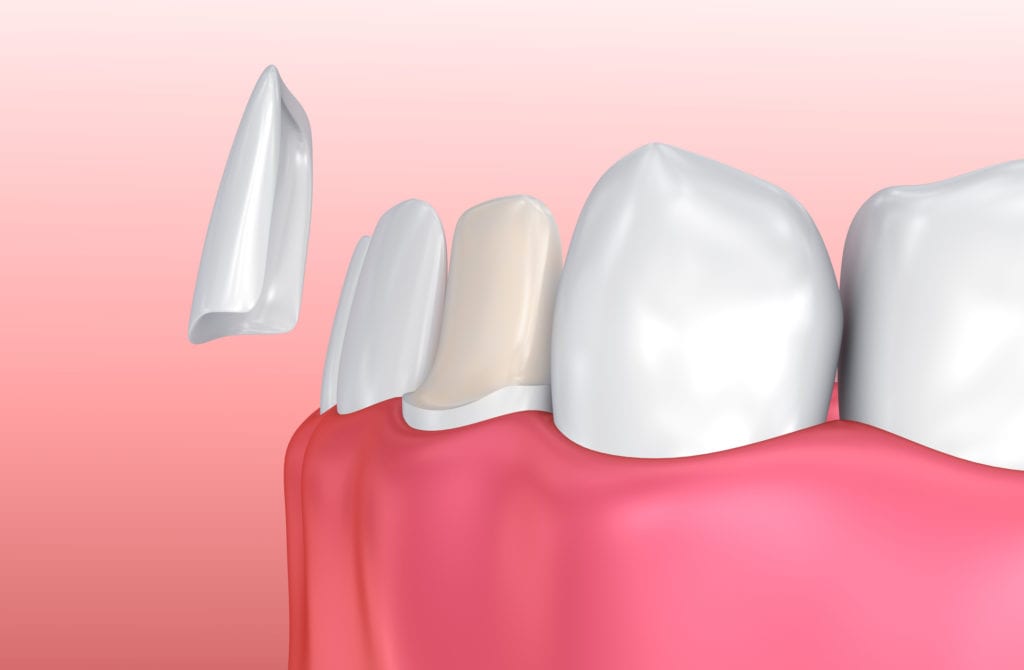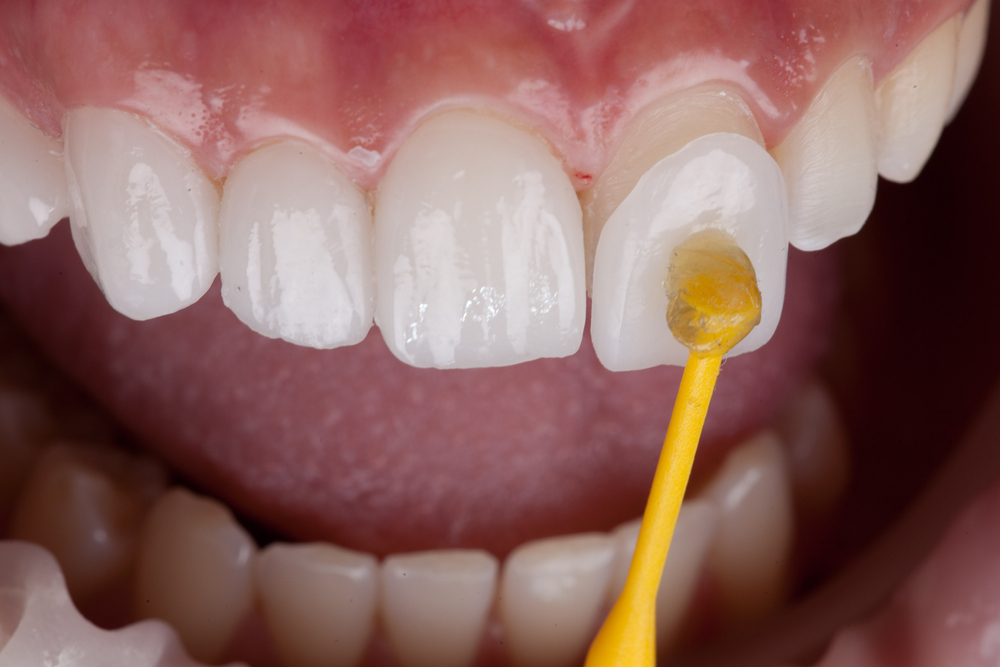Veneers Teeth: Top Benefits for Enhancing Your Smile
Opening the Keys of Veneers: Facts, Kinds, and Advantages for a Beautiful Smile
Veneers offer an engaging service for those seeking to boost their smiles. These oral improvements can attend to different imperfections, from staining to misalignment. With choices like porcelain and composite, individuals can choose based upon their needs and choices. Nonetheless, recognizing the nuances of veneers, including application and treatment, is essential. What variables should one take into consideration before making a choice? The answers may surprise those thinking about this visual dental choice.

Comprehending Veneers: What Are They?
Veneers are slim, personalized shells designed to cover the front surface of teeth, improving their appearance. Normally crafted from resilient products, these coverings are customized to fit each person's teeth exactly. They serve multiple functions, including remedying aesthetic flaws such as staining, chips, or voids. The application process entails a dental practitioner preparing the teeth, typically by removing a little quantity of enamel to guarantee a snug fit. When prepared, the veneers are adhered to the teeth using a strong adhesive.
Individuals often choose veneers for their capability to produce a natural-looking smile while providing a resilient solution to oral imperfections. Unlike various other aesthetic dental care choices, veneers require minimal invasive procedures, making them a prominent selection. The outcome is an improved smile that can considerably increase a person's confidence and self-confidence. Generally, veneers offer an effective method to accomplishing a more unified and attractive oral look.
Sorts of Veneers: Porcelain vs. Compound
When taking into consideration aesthetic oral alternatives, two key kinds of veneers attract attention: porcelain and composite. Porcelain veneers are crafted from a long lasting ceramic product that resembles the all-natural appearance of teeth. They are known for their discolor resistance and ability to reflect light similarly to natural enamel, supplying a visual charm that lots of patients need. The application procedure normally entails more prep work of the tooth structure and may need several check outs to the dental practitioner.
On the various other hand, composite veneers are made from a tooth-colored material that is directly put on the teeth. This kind permits quicker application and can frequently be finished in a single go to. While they are less pricey than porcelain veneers, they might not use the very same long life or resistance to staining. Inevitably, the selection in between porcelain and composite veneers depends upon individual choices, budget plan, and certain dental demands.
The Benefits of Deciding On Veneers
Selecting veneers offers numerous advantages that can considerably improve both the visual appeals and functionality of a person's smile. One of the key advantages is their ability to fix blemishes such as staining, spaces, and imbalance, resulting in a much more consistent appearance. Veneers can additionally improve the toughness of teeth, providing a safety layer that shields them from damage.
They call for minimal tooth prep work contrasted to other oral procedures, protecting even more of the all-natural tooth structure. This preservation contributes to a healthier dental atmosphere while still attaining a stunning smile.
Veneers are highly customizable, enabling people to select the shape, size, and color that ideal matches their choices. Furthermore, they are stain-resistant, making it easier to maintain a eye-catching and bright smile in time. In general, veneers present an effective choice for those looking for both cosmetic improvement and long-term oral wellness advantages.
The Veneer Application Process
The veneer application process involves several vital steps to ensure excellent outcomes. At first, a consultation is conducted to evaluate the person's needs, complied with by the prep work and shaping of the teeth. Lastly, the veneers are bonded in position, with adjustments created a best fit and look.
Initial Appointment Steps
A comprehensive first assessment is essential for anybody considering veneers, as it establishes the structure for a successful therapy. Throughout this conference, the dental expert evaluates the person's dental health, going over any type of existing concerns that could affect the veneer application. This analysis may include X-rays and an aesthetic examination to determine the problem of the teeth and gums.
The dental practitioner additionally engages the individual in a thorough conversation regarding their visual objectives, choices, and assumptions. They might present different veneer choices tailored to the individual's certain demands. In addition, the professional describes the treatment, possible dangers, and aftercare demands, making certain that the person is comfortable and knowledgeable before waging the treatment.
Preparation and Forming Teeth
After the preliminary examination, the next phase involves the preparation and shaping of the teeth to suit the veneers. This essential action is carried out by the dentist, that meticulously examines the tooth structure to identify the amount of enamel that requires to be eliminated. Normally, a slim layer, normally around 0.5 millimeters, is slashed off to ensure an appropriate fit for the veneers. Precision is paramount throughout this procedure, as it influences both the visual outcome and the total comfort. Once the teeth are properly formed, impacts are required to create custom-made veneers that line up completely with the client's dental profile. This precise prep work establishes the phase for a successful veneer application, enhancing both look and feature.
Bonding and Final Modifications
Adhering to the shaping and preparation of the teeth, the bonding procedure begins, noting an essential stage in the veneer application. Throughout this stage, a dental adhesive is applied to the ready tooth surface area, assuring a strong bond between the tooth and the veneer. The dental practitioner meticulously places the veneer, making adjustments to accomplish the wanted positioning and aesthetics. As soon as effectively placed, an unique light is used to heal the adhesive, strengthening the bond. After healing, the dental expert carries out final changes, cutting any type of excess material and improving the veneer's form to guarantee an all-natural appearance. This cautious focus to detail improves both feature and looks, contributing to a total lovely smile that is lasting and durable.
Caring for Your Veneers: Upkeep Tips
Taking care of veneers is crucial to keep their look and longevity. A consistent everyday cleaning routine, mindful evasion of staining foods, and normal dental exams are vital elements of reliable upkeep. These techniques assist guarantee that veneers remain in peak problem and remain to enhance one's smile.
Daily Cleansing Routine
Frequently keeping veneers is vital for their durability and appearance. An appropriate everyday cleaning routine can aid preserve their shine and avoid damages. Dental professionals suggest cleaning two times a day with a soft-bristled tooth brush and fluoride tooth paste, guaranteeing that all surfaces are cleaned gently to stay clear of damaging the veneer surface area. Flossing day-to-day is also essential to eliminate food bits and plaque from in between teeth, where brushes may not get to. Furthermore, making use of an antimicrobial mouthwash can assist preserve oral hygiene without damaging the veneers. It is recommended to prevent unpleasant cleaners and tools that can scratch the veneer. By following these basic steps, people can keep their veneers looking attractive while advertising general oral health and wellness.
Preventing Discoloration Foods
Veneers are made to boost the appearance of teeth, their susceptibility to tarnishing necessitates careful dietary choices. It is essential for Veneers Teeth people with veneers to be mindful of certain foods and beverages that can cause staining. Dark-colored things such as coffee, merlot, and berry juices need to be consumed in small amounts, as they are recognized to discolor both natural teeth and veneers. In addition, acidic foods like citrus fruits canister weaken the bonding agents used in veneers, making them extra susceptible to discoloration. To maintain an intense smile, it is recommended to rinse the mouth with water after consuming staining foods and to practice normal oral hygiene. These thoughtful choices contribute significantly to the longevity and looks of veneers.

Normal Oral Examinations

Maintaining the honesty of veneers needs a dedication to normal oral exams, as these visits play a crucial role in guaranteeing their durability and look. Throughout these check outs, dental experts can assess the condition of the veneers, looking for any indications of wear, damages, or underlying dental concerns. Additionally, regular cleanings help remove plaque and tartar that can gather around the veneers, promoting overall oral health and wellness. Dental practitioners can additionally provide customized guidance on treatment methods and products fit for veneer maintenance. By sticking to a timetable of examinations, individuals can address prospective issues early, guaranteeing their smile stays dynamic and attractive. Inevitably, regular oral check outs are a vital component of veneer care.
Is Veneers the Right Choice for You?
Deciding whether veneers are the right choice typically rests on private oral demands and aesthetic goals. For those looking for to deal with problems such as staining, chips, or imbalance, veneers can give a transformative option. Prospects typically include people with healthy and balanced teeth however desire a boosted smile.
It is crucial to take into account factors such as tooth enamel problem, the extent of dental issues, and the readiness to maintain veneers. Consulting with an oral specialist is crucial, as they can review oral wellness and establish if veneers are ideal
In addition, potential candidates must assess the lasting dedication, as veneers may call for replacement every 10-15 years. Expense factors to consider also play a significant duty, as veneers can be a substantial investment. Inevitably, the decision should be knowledgeable, stabilizing aesthetic desires with useful factors to consider for long lasting outcomes.
Frequently Asked Inquiries
How Much Time Do Veneers Typically Last Before Requiring Replacement?
Veneers generally last between 10 to 15 years prior to requiring substitute. Factors such as oral hygiene, lifestyle options, and material top quality can influence their longevity, making routine dental exams vital for preserving their condition.
Are Veneers Safe for Individuals With Sensitive Teeth?
Veneers can be secure for people with delicate teeth, but it typically relies on the intensity of sensitivity and the dentist's technique. Consulting an oral professional prior to continuing is important to assure ideal end results.
Can Veneers Be Gotten Rid Of or Changed Conveniently?

Do Veneers Stain Over Time, and How Can I Stop It?
Veneers can tarnish gradually, particularly from foods and drinks like coffee or red wine. To avoid discoloration, keeping great dental hygiene, using a straw for beverages, and normal oral cleanings are recommended techniques.
What Is the Expense Array for Obtaining Veneers?
The cost of veneers typically ranges from $500 to $2,500 per tooth, depending on aspects such as material type, dental professional experience, and location. Clients should talk to dental professionals for individualized quotes and financing alternatives.
As soon as the teeth are adequately formed, impacts are taken to produce personalized veneers that align completely with the individual's oral profile. Throughout this phase, an oral adhesive is applied to the ready tooth surface area, guaranteeing a solid bond in between the veneer and the tooth. It is important to take right into account aspects such as tooth enamel condition, the degree of oral problems, and the determination to preserve veneers. Veneers can be risk-free for individuals with delicate teeth, however it frequently depends on the intensity of sensitivity and the dentist's method. The price of veneers normally ranges from $500 to $2,500 per tooth, depending on elements such as product type, dental expert experience, and location.